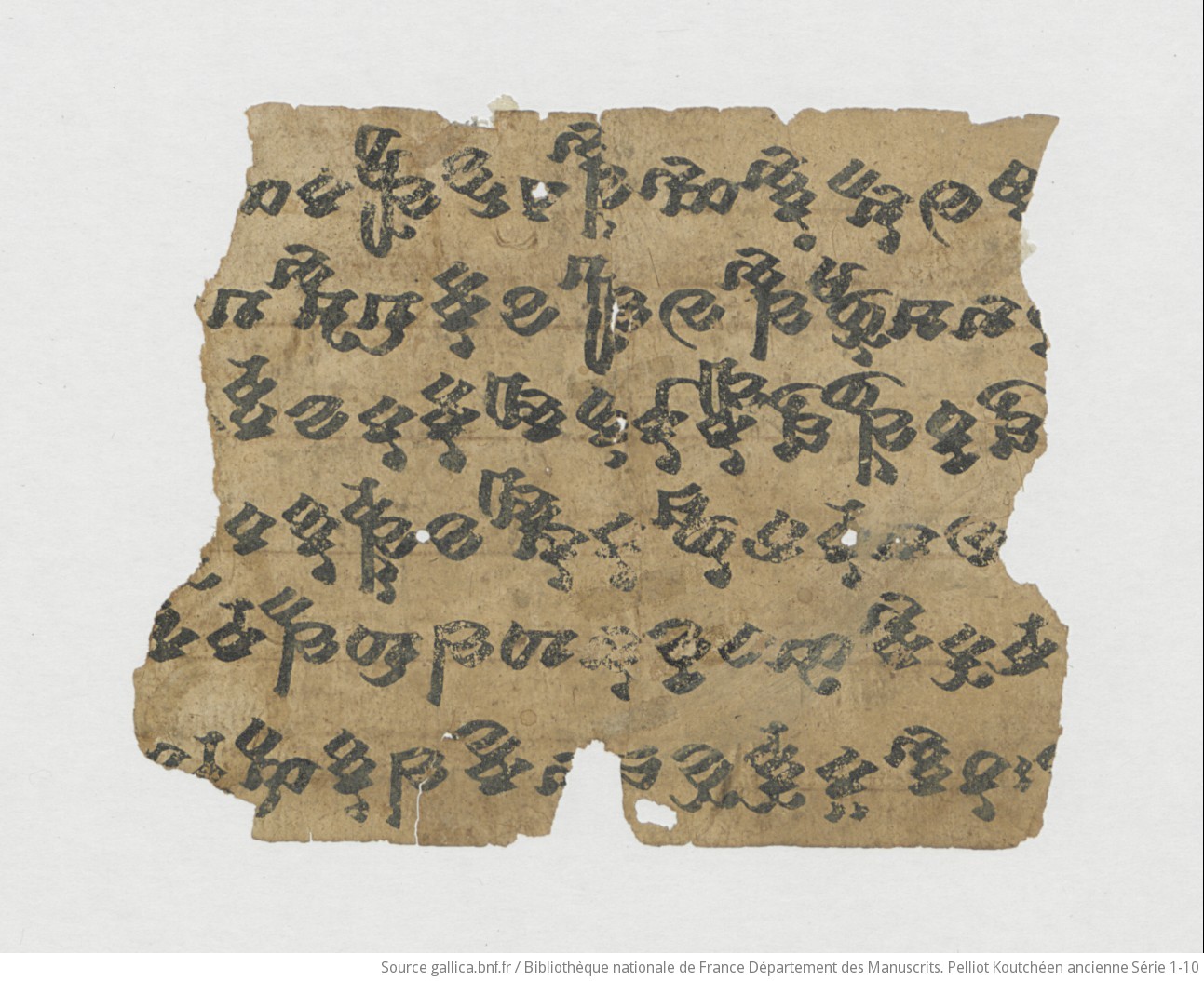Work in progress
PK AS 7O
| Known as: | PK AS 7O; Pelliot Koutchéen Ancienne Série 7O |
|---|
| Cite this page as: | Georges-Jean Pinault; Melanie Malzahn (collaborator); Michaël Peyrot (collaborator). "PK AS 7O". In A Comprehensive Edition of Tocharian Manuscripts (CEToM). Created and maintained by Melanie Malzahn, Martin Braun, Hannes A. Fellner, and Bernhard Koller. https://cetom.univie.ac.at/?m-pkas7o (accessed 14 Jul. 2025). |
|---|
Edition |
| Editor: | Georges-Jean Pinault; Melanie Malzahn (collaborator); Michaël Peyrot (collaborator) |
|---|
| Date of online publication: | 2012-08 |
|---|
Provenience |
| Main find spot: | Duldur-akur |
|---|
| Collection: | Bibliothèque nationale de France, fonds Pelliot Koutchéen (Paris) |
|---|
Language and Script |
| Language: | TB |
|---|
| Linguistic stage: | classical |
|---|
| Script: | classical |
|---|
Text contents |
| Title of the work: | Karmavibhaṅga |
|---|
| Text genre: | Literary |
|---|
| Text subgenre: | Doctrine |
|---|
| Verse/Prose: | verse |
|---|
Object |
| Manuscript: | Karmavibhaṅga β |
|---|
| Material: |
ink
on paper |
|---|
| Form: | Poṭhī |
|---|
| Size (h × w): | 8.2 × 10 cm |
|---|
| Number of lines: | 6 |
|---|
| Interline spacing: | 1.2 cm |
|---|
Images
Transliteration
| a1 | /// – : ce ntsa nä tko wo ma [s](·) kwa la tte ytā r[i] [c]· /// |
|---|
| a2 | /// kā no ksa yi ta rwa se ha la hā lna ka n[m]a /// |
|---|
| a3 | /// tu sa ke tā ñme ne stsye wa lkai tte ta [r]·[o] /// |
|---|
| a4 | /// ā rta lñe ā klye kre ntaṃ tsya kne ne wa tka /// |
|---|
| a5 | /// sa ṣa ñśau ltsa o lypo ai kne pā ṣtsi pa /// |
|---|
| a6 | /// tsa o sne (–) ntse ysa ltse e ṅka lśco na ya /// |
|---|
| b1 | /// wi tskai pre ṅke yso mo yo lai ñe ntaṃ ts[y]a /// |
|---|
| b2 | /// kw[ä] ntsa ññe ntse sa naṃ wā ṣmoṃ wai ke rse rttse /// |
|---|
| b3 | /// ksa lkau ca ste pa pā ṣṣo rñe tu sa nai śai /// |
|---|
| b4 | /// ·k· wi kṣa lyi sa ai śau mye ntso a ppa mā /// |
|---|
| b5 | /// ṣṣo rñe tu sa śau ltsa pā ṣtsyai kne 30 5 yso /// |
|---|
| b6 | /// kwi pe mpreṃ tsñe ntse : o [stka] l[y]a mñe ntse po yā ta /// |
|---|
Transcription
Translation
| a1 | ... Urged by these ones, he went his way unabated ... |
|---|
| a2 | ... But why someone should take the [deadly] halāhala poison in order to cure diseases? ... |
|---|
| a3 | ... Therefore the one whose desire [is] to be unconcerned ... |
|---|
| a4 | ... preference ..., the study in the way of the good ones differed ... |
|---|
| a5 | ... Therefore during the own life the superior duty [is] to observe the ob(servance) ... |
|---|
| a6 | ... in the house of ... (pl.) greed, discord, passion, hatred, (pride?) |
|---|
| b1 | ... the root ..., the island altogether of all sorts of evil ... |
|---|
| b2 | ... the enemy [and] the friend of firmness ..., the lie [is] hateful ... |
|---|
| b3 | ... (the Buddha) is the one who pulls out ...; therefore the observance (should be studied?) carefully ... |
|---|
| b4 | ... through the avoidance by the sages (to treat others) with disdain ... |
|---|
| b5 | ... therefore it is the duty to observe the observance during the life. 35. Altogether ... |
|---|
| b6 | ... of the shame [and] of the truthfulness; every capacity of staying in the house ... |
|---|
Commentary
Linguistic commentary
| * | There are two forms with o-mobile, no doubt in colon/pāda-final position. |
|---|
| n1 | The form halahāl is a loan from Skt. halāhala- ‘(a kind of) deadly poison’. |
|---|
| n2 | Since no root wälk- is attested so far in TB, what we have here is rather a variant of empalkaitte ‘unconcerned, not worried’ written with ‹wa› for ‹pa›, which has some parallels. |
|---|
| n3 | The hapax ysaltse ought to be understood as an abstract parallel to the other terms of the same line which, judging from śconay, are all in the oblique. It would be a substantivized adjective based on the stem underlying the noun ysalye ‘discord, enmity’. |
|---|
| n6 | kälyamñe is an abstract based on an unattested agent noun in -mo from the root käly- "to stay, remain". |
|---|
Remarks
| * | Recto and verso cannot be ascertained. |
|---|
Philological commentary
| n4 | At the end amāṃ ‘pride’ may be restored. |
|---|
| n5 | The only sensible separation is to take wikṣalyisa as a single word form. In that case we have an uncommon form of the abstract, which is based on the gerund wikṣalle or on the abstract wikṣalñe. For the formation see the discussion on parskalyisa in PK AS 16.2 b 3. |
|---|




